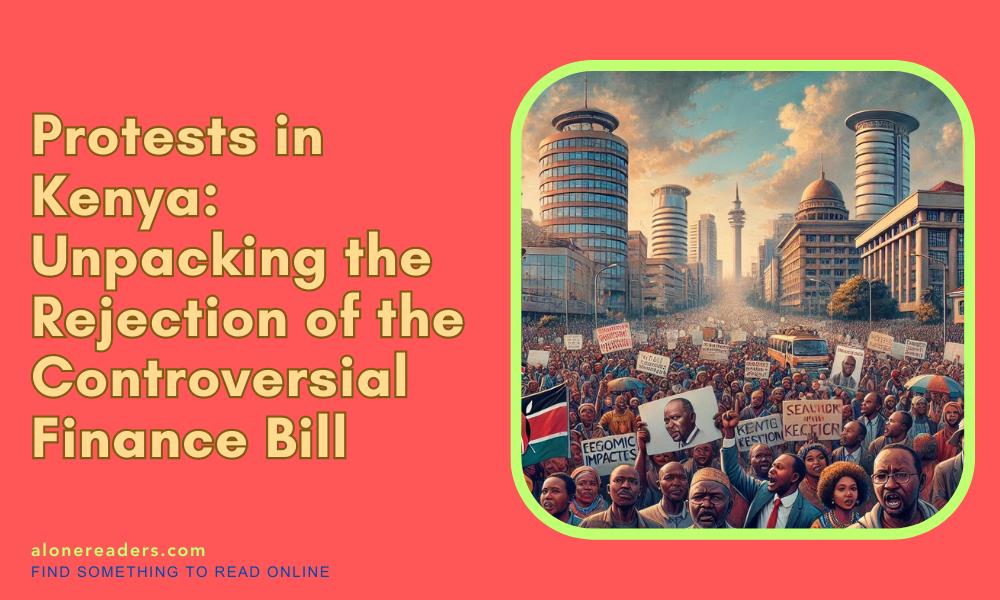
Kenya has recently been gripped by a wave of protests following the rejection of a controversial Finance Bill. These protests have brought to light deep-seated economic and social issues within the country, prompting widespread public outrage and debate. To understand the gravity of the situation, it is essential to delve into the specifics of the Finance Bill, the reasons for its rejection, and the subsequent public response.
The Finance Bill in question was introduced by the Kenyan government with the aim of increasing revenue through various taxation measures. The bill proposed significant changes to the tax structure, including the introduction of new taxes and the increase of existing ones. Among the most contentious proposals were the introduction of a housing levy, an increase in Value Added Tax (VAT) on essential goods, and higher excise duties on fuel. These measures were touted as necessary to bridge the budget deficit and fund key development projects. However, they were met with fierce opposition from various sectors of society.
One of the primary reasons for the bill's rejection was the economic burden it was expected to place on the average Kenyan. The proposed taxes on essential goods and services, such as food and fuel, were seen as disproportionately affecting low and middle-income households. Critics argued that the bill would exacerbate the already high cost of living, making it even harder for ordinary citizens to make ends meet. The proposed housing levy, in particular, sparked significant backlash, with many viewing it as an additional financial strain on already struggling households.
The opposition to the Finance Bill was not limited to the general public. Various industry groups and business associations also voiced their concerns, arguing that the proposed tax measures would stifle economic growth and deter investment. They warned that the increased cost of doing business would lead to higher prices for consumers and potential job losses, further aggravating the country's economic challenges. These concerns were echoed by opposition politicians, who accused the government of failing to consult widely before drafting the bill and disregarding the potential negative impacts on the economy.
In response to the widespread criticism, the Kenyan government defended the Finance Bill, arguing that the proposed taxes were necessary to address the country's fiscal challenges. They pointed to the growing public debt and the need to fund critical infrastructure projects as justification for the new tax measures. The government also promised to implement measures to cushion the most vulnerable members of society from the impact of the new taxes. However, these assurances did little to quell the growing discontent.
The rejection of the Finance Bill led to a series of protests across the country. In major cities like Nairobi and Mombasa, thousands of citizens took to the streets to express their frustration and demand the withdrawal of the bill. These protests were characterized by clashes between demonstrators and police, leading to several injuries and arrests. The intensity of the protests underscored the deep-seated anger and dissatisfaction among the Kenyan populace.
The protests also highlighted broader issues of governance and public trust. Many Kenyans expressed frustration with what they perceived as the government's lack of accountability and transparency in managing public resources. There were calls for greater public participation in the formulation of policies that directly impact citizens' lives. The rejection of the Finance Bill became a rallying point for broader demands for economic and social justice.
As the protests continued, the government eventually announced the withdrawal of the Finance Bill and promised to review the proposed tax measures. This decision was seen as a significant victory for the protestors and a testament to the power of public mobilization. However, the underlying issues that sparked the protests remain unresolved. The country continues to grapple with high levels of public debt, economic inequality, and the need for comprehensive fiscal reforms.
The rejection of the Finance Bill and the ensuing protests have important implications for Kenya's future. They underscore the need for a more inclusive and participatory approach to policymaking, where the voices of ordinary citizens are heard and considered. The government must also address the root causes of economic discontent, including unemployment, poverty, and the high cost of living. Only through meaningful reforms and genuine engagement with the public can lasting solutions be found.
In conclusion, the protests in Kenya over the rejection of the controversial Finance Bill have brought to the fore critical issues of economic policy, governance, and public trust. While the withdrawal of the bill is a positive step, it is only the beginning of a longer journey towards addressing the country's fiscal challenges and ensuring that economic policies are fair and equitable. The Kenyan government's ability to navigate these challenges will be crucial in shaping the country's economic future and maintaining social stability.